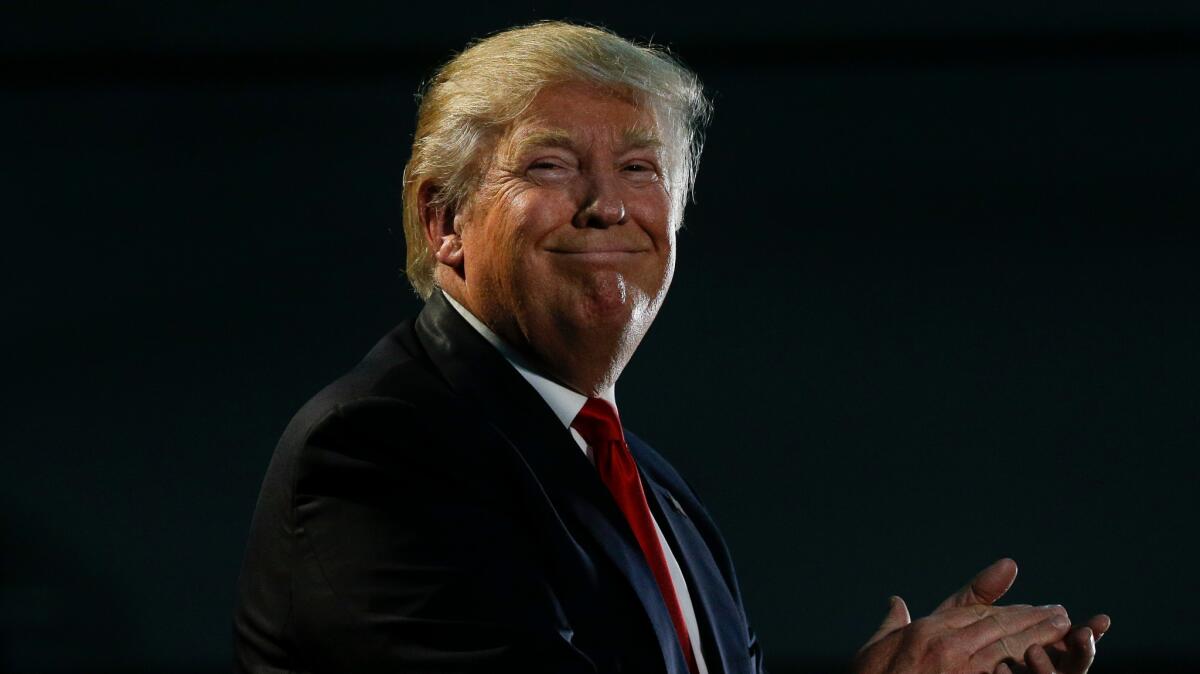Op-Ed: Donald Trump’s post-Orlando conspiracy theory

- Share via
On Monday morning, Donald Trump hinted that President Obama may have welcomed the slaughter of 49 clubgoers in Orlando, Fla. “He doesn’t get it, or he gets it better than anybody understands,” the presidential candidate said on Fox. “It’s one or the other.” He repeated the sentiment later in the show, declaring that the president “is not tough, not smart — or he’s got something else in mind.”
Trump left it to his listeners to infer what that “something else” might be, but it’s not hard to see what he was implying. The man is already prone to saying things like “If President Obama’s goal had been to weaken America, he could not have done a better job.” This week, Trump just took it a step further. Perhaps, he suggested, that really is Obama’s goal.
Those comments were an off-the-cuff encapsulation of one of the core components of Trumpism: not just conspiracy theories — they’re rather common among politicians, even mainstream ones — but conspiracy theories of a particular kind.
You can divide most of Trump’s conspiracy rhetoric into two categories.
In the first, Trump tries to cast suspicion on his political rivals. The most infamous example of this was when he implied that Ted Cruz’s dad was mixed up with the JFK assassination, citing the National Enquirer as his source. Less flamboyantly, he has accused Cruz of stealing the Iowa caucuses and he periodically suggests that the people who protest his rallies are paid to do so.
The second category is more ideological. Trump at his core is a nationalist, and nationalists are especially likely to embrace Enemy Outside stories. In these tales, the conspirators are based outside the community’s gates; if they’re not out to conquer your country, they at least aim to subvert and outwit it. Listen to any Trump speech, and you’re likely to hear some version of this. China is plotting against us. Mexico is deliberately dumping its criminals on our side of the border. Syria’s refugees are a jihadist Trojan horse.
On some days Trump’s Obama is a wily alien agent deliberately undermining the country. Other days, he’s a stupid dupe.
Such stories are central to Trump’s worldview — and to his sales pitch. “I have great respect for China, but their leaders are too smart for our leaders,” he tells us. “Our leaders don’t have a clue.” That quote comes from his Super Tuesday victory speech, but he has said the same thing in countless ways on countless days: We’re being led by weaklings and naifs; I’ll be the tough, smart commander the nation needs. Vote for Trump!
There is a tension here. Those weaklings and naifs, after all, are the same leaders who are supposed to be conniving Machiavellis when it comes to domestic politics — creating false-flag protests, stealing elections, rigging the game. Now, there are ways to resolve that tension without contradiction. Given his string of political victories, Trump can always shrug and say the conspiracy arrayed against him is simply inept. But the tension is there, and it bubbles up most obviously in Trump’s rhetoric about Obama.
Half a decade ago, Trump leaped headfirst into birtherism. The birther story has taken several forms, but the usual upshot is that Obama was born in Africa, not Hawaii, and therefore has no right to be president. In other words, the president is foreign and concealing it; the man charged with defending American interests is not just metaphorically but literally un-American. It’s a horror movie on a grand political scale: “The call is coming from inside the White House!”
On some days Trump’s Obama is a wily alien agent deliberately undermining the country. Other days, he’s a stupid dupe who can’t handle the foreign forces assembled against us. And if you catch Trump at the right moment, he might bring up both accusations at once: “He doesn’t get it, or he gets it better than anybody understands. It’s one or the other.”
Jesse Walker is books editor of Reason magazine and author of “The United States of Paranoia: A Conspiracy Theory.”
Follow the Opinion section on Twitter @latimesopinion and Facebook.
ALSO
The winds of change are blowing in America — just not California’s way
After the Orlando shooting, pundits on both sides read the same tired lines from their scripts
Amid the complex politics of the Orlando attack, let’s not forget LGBT perspectives
A cure for the common opinion
Get thought-provoking perspectives with our weekly newsletter.
You may occasionally receive promotional content from the Los Angeles Times.






